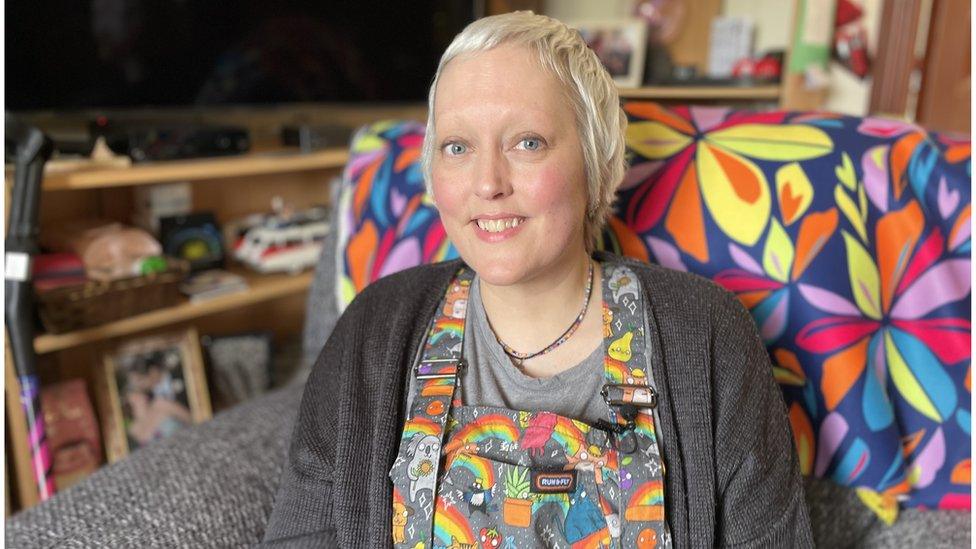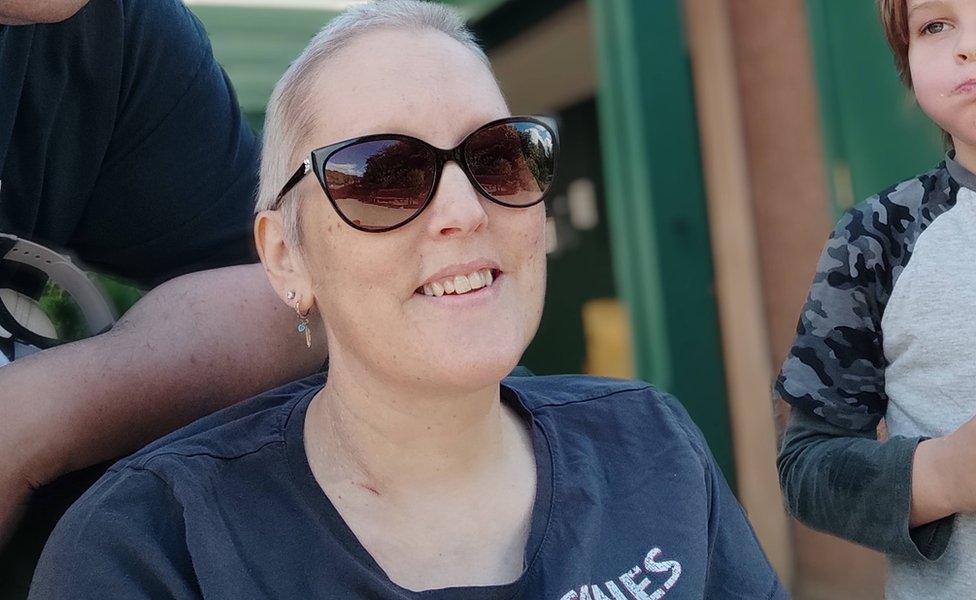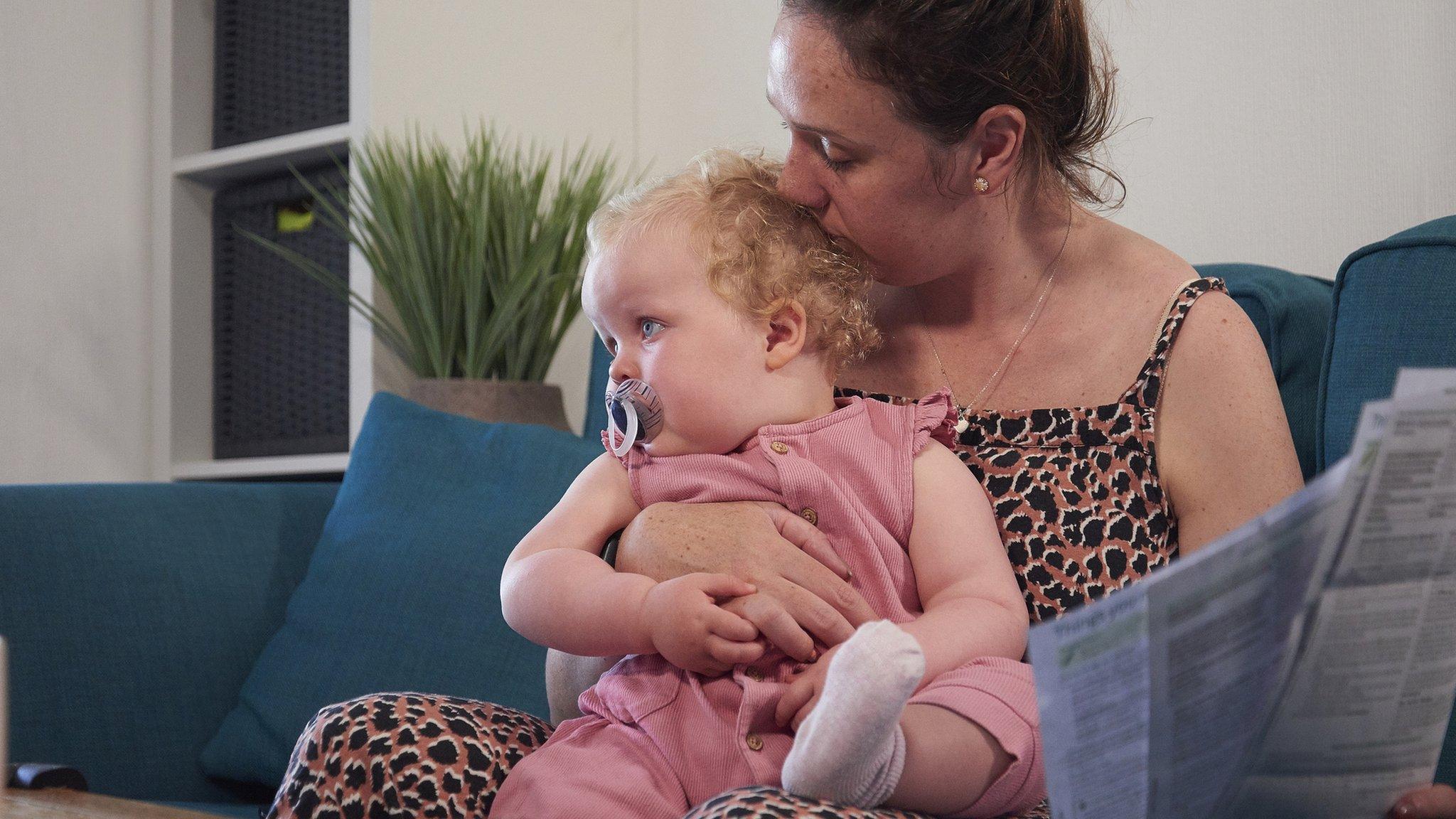I have cancer and can't afford to heat my home
- Published

Households across the UK are preparing for an unprecedented 80% increase in energy bills this October. A typical bill is expected to reach £3,549 a year - but what about costs in the coldest parts of the UK?

Melanie Finlay had hoped to spend her summer making memories with husband Tom and seven-year-old son Joseph - but spent a large chunk in a hospice to manage her pain levels.
The 48-year-old was given between 12 and 18 months to live earlier this year as metastatic cancer had spread to her bones, lungs, hips, knees and bone marrow.
She is now on what she describes as a "buffet" of medication to manage her pain at home - but expects this will become more difficult in the colder months.
"It's one of the most painful cancers you can have and the cold weather has a major affect on your bones wherever you live," she said.
"But being in the Highlands it's a damp cold you get here - it's definitely uncomfortable."

Melanie Finlay married husband Tom in April - she is now saving for her funeral
The family lives in a two-bedroom flat with a pre-paid energy meter in Inverness - one of the coldest of the UK's larger towns and cities.
It has recorded relatively mild winters in recent years, but the temperature still fell as low as -9.1C in 2020-21.
Melanie told BBC Scotland she combatted the discomfort by having her heating on a constant low burn during the winter months, but it is not something she can afford this year given the energy cap increase.
Previously, the family spent at least £300 a month on gas and electricity, but Melanie said it was getting to the point where £100 for electricity alone lasted just over a week.
"I've been putting money aside during summer and this will hopefully go towards heating this winter," she said.
"We've got extra duvets and hot water bottles and I'll be able to wrap my legs up in blankets.
"There are places I could go to get out of the house if I need to, like Maggie's Centre at Raigmore - they're emphasising if you need a cup of tea and keep warm [people can go there.]"
'We'll heat one room'
The family have taken steps to become more energy efficient and many of their appliances are electric.
But because Tom works from home in order to be Melanie's carer, their mitigations will likely not do much to ease the expensive months ahead.

"We'll probably turn the heating off in the front room and just have it on in the back bedroom.
"We've changed the lights to energy-saving bulbs and are going to seal the windows - but it's just going to be a case of fingers crossed and see how it goes."
'It's taking away our pride'
In thinking about how to cut costs, George and Maureen Fallar have started buying cheaper food brands and bought a slow cooker so they could avoid using their oven.
They have also compiled a list of places they can take their grandchildren for free.

But the 76-year-olds from Cambuslang in Glasgow said this was not enough to compensate for rising energy costs - and are also considering selling their car.
"We don't want to be carless but it might have to go," said Maureen. "That's going to have a huge impact on our lives.
"Not being able to treat your grandchildren for instance - that's part and parcel of being a grandparent. It gives you a lot of joy in your life.
"We're pensioners, we don't ask for help - we never have and we're quite proud of that. It's taking our pride away, our confidence in being able to cope with life - because we're not going to be able to cope with these bills."
The couple agree they currently live a comfortable life and said their family would never see them stuck - but they worry about elderly friends and neighbours who have no support.
"The more vulnerable among us, I think we're going to see the death rate go sky high," said Maureen
A typical annual bill is currently £1,971 but new forecasts suggest that could peak at well over £6,000 a year next year, heaping pressure on a new prime minister to give urgent extra support for those struggling or unable to pay.
Pre-payment meter customers, often among the most vulnerable consumers, will pay an extra £59 a year on their bill from October.
'This will cause illness and death'
A number of charities in Scotland have strongly criticised the announcement from Ofgem, with Save The Children calling the situation a full-blown economic crisis.
Claire Telfer, head of Scotland at the charity, said: "Children are at serious risk from today's announcement and could spend this winter in cold homes, with fewer hot meals, despite the best efforts of their parents and carers. Our children deserve better.
"The UK and Scottish governments need to act now."
Matthew Reed, Chief Executive of Marie Curie, said: "Terminally ill people could freeze to death this winter without further support."
"The need to stay warm to keep pain at bay, and power specialist medical equipment means that energy bills for some terminally ill people will be thousands of pounds higher than the average household. Many won't be able to afford this.
"Dying people are falling through the cracks. They need targeted government support now."
The Poverty Alliance, an anti-poverty network in Scotland, said the UK government and Ofgem had failed in their duty to protect people and give them security.
Director Peter Kelly said: "Ministers knew this was coming for months but have put nothing in place to prevent a humanitarian disaster.
"We must be clear. Bills of this size will be completely and utterly unaffordable for people on low incomes, many of whom have already been struggling with cuts to social security and a huge wage squeeze for years and years. They will cause stress, anxiety, illness, debt and death."

So far, the UK government has promised a £15bn package of support for UK households. This includes two payments totalling £650 for eight million low-income households on benefits and a £400 grant for all homes.
The Scottish government has called on the UK government to use its borrowing powers to cancel the price increase, with First Minister Nicola Sturgeon saying the price was unaffordable for millions.
Meanwhile, Scotland's Energy Secretary Michael Matheson said Ofgem's announcement would only escalate the "enormous strain" upon people and businesses who were dealing with April's increase, as well as the wider cost of living pressures.
He said the Scottish government had prepared a £1.2m funding package to expand energy advice services.
On Monday, a £2m Social Housing Fuel Support Fund will also open, he added.
Scottish Labour leader Anas Sarwar said both governments had a moral duty to act. He said the UK government should introduce an energy price freeze while the Scottish government should freeze rents, lower commuting costs and support businesses.


How are you dealing with the rising cost of living? You can let us know your tips and hacks for saving money on things like energy, food and transport. You can also send us any cost of living questions you want us to help answer.
In some cases your question will be published, displaying your name, age and location as you provide it, unless you state otherwise. Your contact details will never be published. Please ensure you have read the terms and conditions.
If you are reading this page on the BBC News app, you will need to visit the mobile version of the BBC website to submit your question on this topic.
- Published26 August 2022

- Published26 August 2022

